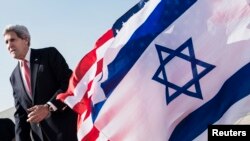JERUSALEM —
Israel published plans on Monday to build 272 homes in settlements in the occupied West Bank even as U.S. Secretary of State John Kerry wrapped up his 10th visit in a year trying to forge an Israeli-Palestinian peace deal.
Palestinians fear Israeli settlements, built on occupied land and deemed illegal by the United Nations, will deny them a viable state and have warned that further construction could derail the talks that Kerry has struggled to keep on track.
The U.S.-brokered Israeli-Palestinian talks resumed in July after a three-year freeze, with Kerry pushing for an agreement within nine months despite scepticism on both sides that a successful outcome is possible. Israel says it is building settler homes in areas it intends to keep in any final peace agreement.
"What we're seeing today is the implementation of a decision from October," said an official in Prime Minister Benjamin Netanyahu's office. He was referring to formal publication of the settlement home-building scheme. The public will now have 60 days to voice any opposition before the plan moves forward.
A Defense Ministry official said the plans for 272 more homes in the Ofra and Karnei Shomron settlements were preliminary and must pass a few more stages of authorization before construction began.
Kerry shuttled between Israeli and Palestinian leaders, and even visited Jordan and Saudi Arabia, on his latest peacemaking trip in pursuit of a "framework agreement" that would pave the way to a permanent accord.
While Palestinians see a major obstacle in Israel's settlement policy, many Israelis question the credibility of Palestinian President Mahmoud Abbas, especially as Gaza is run by his rivals - Hamas Islamists who oppose peacemaking.
Still, Kerry said on Saturday that Israel and the Palestinians were making progress towards a framework deal but still have some way to go.
While pursuing settlement expansion, Israel has been releasing Palestinian prisoners in four stages as part of U.S.-brokered peace efforts.
In all, 104 long-serving Palestinian inmates, most convicted of killing Israelis, will be freed in what the United States sees as a vital confidence-building measure.
Twenty-six were freed last month in the third stage of the releases.
Palestinians fear Israeli settlements, built on occupied land and deemed illegal by the United Nations, will deny them a viable state and have warned that further construction could derail the talks that Kerry has struggled to keep on track.
The U.S.-brokered Israeli-Palestinian talks resumed in July after a three-year freeze, with Kerry pushing for an agreement within nine months despite scepticism on both sides that a successful outcome is possible. Israel says it is building settler homes in areas it intends to keep in any final peace agreement.
"What we're seeing today is the implementation of a decision from October," said an official in Prime Minister Benjamin Netanyahu's office. He was referring to formal publication of the settlement home-building scheme. The public will now have 60 days to voice any opposition before the plan moves forward.
A Defense Ministry official said the plans for 272 more homes in the Ofra and Karnei Shomron settlements were preliminary and must pass a few more stages of authorization before construction began.
Kerry shuttled between Israeli and Palestinian leaders, and even visited Jordan and Saudi Arabia, on his latest peacemaking trip in pursuit of a "framework agreement" that would pave the way to a permanent accord.
While Palestinians see a major obstacle in Israel's settlement policy, many Israelis question the credibility of Palestinian President Mahmoud Abbas, especially as Gaza is run by his rivals - Hamas Islamists who oppose peacemaking.
Still, Kerry said on Saturday that Israel and the Palestinians were making progress towards a framework deal but still have some way to go.
While pursuing settlement expansion, Israel has been releasing Palestinian prisoners in four stages as part of U.S.-brokered peace efforts.
In all, 104 long-serving Palestinian inmates, most convicted of killing Israelis, will be freed in what the United States sees as a vital confidence-building measure.
Twenty-six were freed last month in the third stage of the releases.





